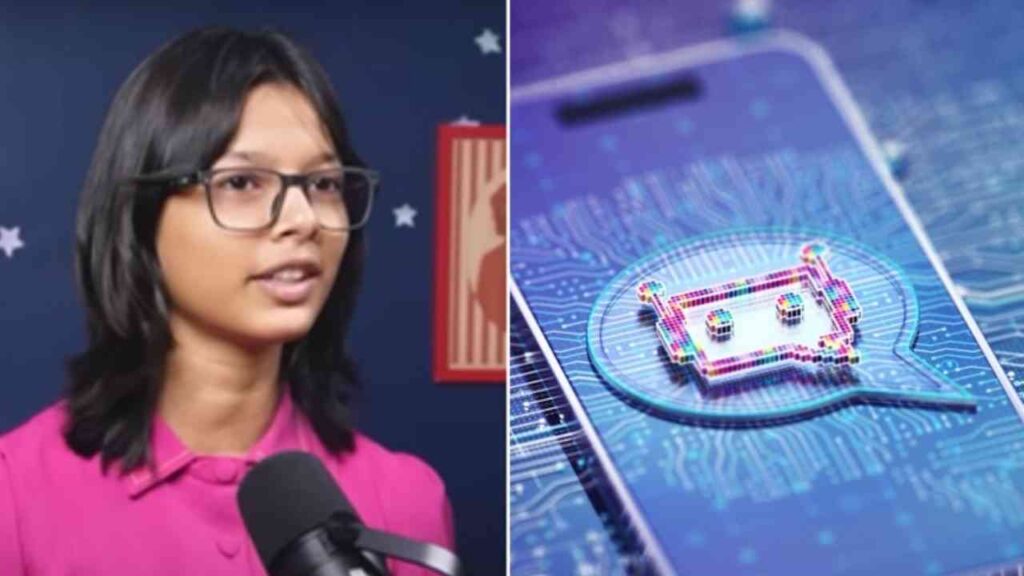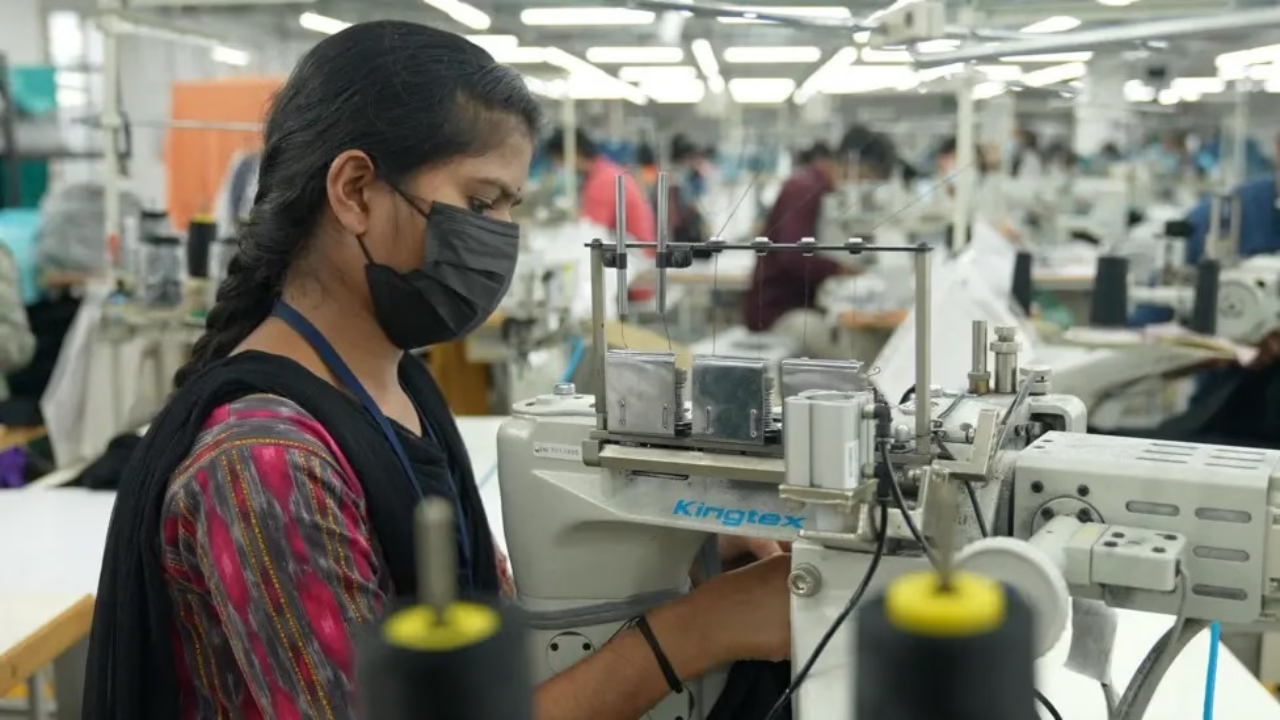14-Year-Old Parineeti’s Radical Education Choice Divides Internet
School Dropout Becomes AI Automation Expert, Plans Financial Freedom by 20
A 14-year-old entrepreneur has ignited a fierce debate about modern education after dropping out of school at 13 to pursue a career in artificial intelligence, building her own AI automation agency and working with paying clients.
From Student to AI Expert
Parineeti’s unconventional journey began when her father encouraged her to spend two hours daily exploring ChatGPT. What started as a casual introduction quickly evolved into an obsession that would reshape her entire life trajectory.
“Those two hours soon turned into four. I would pick any random topic and research it with ChatGPT. I used to tell it what I learned,” she explained during an appearance on the podcast “Just Kidding With Sid!” hosted by Siddhesh Lokare.
Her relationship with AI became increasingly personal and dependent. “Mummy was telling me that these days you don’t talk to me, what happened to you, have you got a boyfriend? No mummy I am talking to ChatGPT,” she admitted, acknowledging her unusual attachment to the technology.

Academic Integration and Controversy
Parineeti began incorporating AI into her academic work, using ChatGPT to assist with examinations despite teacher disapproval. “Teachers discourage that don’t use AI, do it yourself but like, AI is the future, then why should I not use AI. I even passed my Sanskrit exam due to ChatGPT,” she revealed.
This approach culminated in her decision to abandon traditional education entirely. “School was kind of wasting my potential,” the teenager declared. “If I had stayed in school, I would not have been able to do all this.”
Building an AI Business
At just 14, Parineeti now operates her own AI automation agency, working with 4-5 clients to streamline their business operations. Her services include conducting audit calls with business owners, understanding their strategies, and implementing semi-automated solutions.
“I basically run an AI automation agency and I take audit calls of business owners in it and in that I understand their whole business strategy and semi automate their business,” she explained.
Despite having no coding background, Parineeti leveraged ChatGPT to write code and develop custom solutions. She has even created AI avatars, including a digital clone of herself that she finds remarkably accurate.
“(It’s) My clone. I sound less like me but it sounds more like me. Like am I Parineeti or is that Parineeti?” she laughed, highlighting the sophisticated nature of her AI creations.

Financial Goals and Future Plans
When asked about her earnings, Parineeti was direct: “Yes,” confirming that her AI venture generates income. Her ambitious goal reflects a desire for early financial independence that challenges conventional life planning.
“It is my vision that if I become financially free by the age of 20 then I will have a lot of fun after 20. I am not going to do anything after twenty,” she stated, outlining a plan that prioritizes financial success in her teenage years.
Family Dynamics and Concerns
While her parents support her entrepreneurial pursuits, her mother expresses concern about the social implications of her choices. Parineeti herself acknowledges potential drawbacks to her AI-dependent lifestyle.
“Yes I am concerned about this too, I struggle to give my own opinions. I have become a little more dependent on ChatGPT than I should have been,” she admitted, recognizing the challenges of her unconventional path.
Her relationship with AI has even influenced family dynamics, leading her to create an AI avatar of her father. “I wish it was real so he wouldn’t scold me for doing all this,” she joked.
Divided Public Response
Parineeti’s story has generated intense debate across social media platforms, with responses ranging from admiration to deep concern about the implications of her choices.
Supporters’ Perspective
Many praise her entrepreneurial spirit and adaptation to future technological trends. One supporter noted: “A few months ago, I met her. I was surprised by her vision. She represents the future generation that only needs smart work.”
Another admirer emphasized practical success over traditional education: “She is able to make money for her living, which many other educated unemployed engineers cannot earn. Finally, she has made herself ready for the future.”
Critics’ Concerns
However, significant criticism focuses on the potential risks of glamorizing school dropout decisions. One concerned parent wrote: “This is the worst thing a parent can allow their child to do.”
Educational traditionalists worry about the broader impact on students. “Don’t glamorise such dropouts. How do we even know that what she says is right? This can misguide young kids,” cautioned one critic.
Others question the authenticity and sustainability of her success: “Very bad example to use ChatGPT and leave school. I’m sure she got special support to start her business.”
Broader Educational Implications
The controversy surrounding Parineeti’s choices reflects larger questions about education’s role in an AI-driven future. Some educators worry about students becoming overly dependent on AI tools, while others see integration as inevitable.
One parent described observing their daughter’s reliance on digital tools: “My daughter’s school encourages them to use AI, Apple gadgets but I always ask for theoretical knowledge on papers. I can see the helplessness on my daughter’s face the moment I ask her anything from books.”
Expert Analysis and Warnings
Podcast host Siddhesh Lokare raised concerns about Parineeti’s long-term planning, particularly her intention to “not do anything” after achieving financial freedom at 20. “This is the loop, the hyper loop. Because you may never be satisfied,” he observed.
This comment highlights potential psychological and social challenges associated with such early career decisions and retirement planning.
The Future of Work and Education
Parineeti’s story embodies broader tensions between traditional education models and rapidly evolving technological capabilities. Her success in building a functional business using AI tools challenges assumptions about necessary educational foundations while raising questions about social development and critical thinking skills.
Ongoing Debate
The polarized response to Parineeti’s journey reflects society’s struggle to balance innovation with established educational wisdom. Supporters view her as representing the future of work, where technological proficiency trumps traditional credentials. Critics worry about the social and developmental costs of abandoning comprehensive education.
Looking Forward
As Parineeti continues developing her AI business and working toward her goal of financial freedom by 20, her story serves as a case study for the evolving relationship between education, technology, and career development in the digital age.
Whether her approach proves sustainable and fulfilling remains to be seen, but her bold choices have undeniably sparked important conversations about preparing young people for an AI-transformed future.
Her clear declaration—”AI first, fun later”—encapsulates both the promise and potential risks of her unconventional path, leaving observers to wonder whether she represents the future of education or a cautionary tale about the importance of balanced development.






